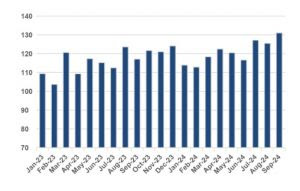With the approach of summer and year-end holidays, travel demand increases, along with the number of cyber scams. According to a DataSenado survey, 24% of Brazilians have been victims of virtual crimes in the last 12 months, including frauds related to the tourism sector, such as fake travel packages and credit card cloning. São Paulo leads the states with the highest number of victims, followed by Mato Grosso and the Federal District. In times of increased activity in the sector, these scams become even more frequent and sophisticated.
According to a study by Kaspersky, a cybersecurity company, the number of cyberattacks in Brazil increased by 38% in the first quarter of 2024. With Black Friday promotions, the trend is that scam attempts will intensify in the coming weeks, with increased demand for travel packages and online bookings.
The lawyer and data protection specialist, Guilherme Guimarães, warns that tourism has become an attractive target for criminals due to the large amount of personal and financial data shared during the booking processes. "Consumers are more susceptible to scams during the holiday period, when the rush to secure a good deal can lead to impulsive and careless decisions. Fake websites, email offers, and social media ads have been the main methods used by scammers," he explains.
HOW DO SCAMS WORK?
Cyberattacks in the tourism sector mainly occur through fake websites that imitate major hotel chains and travel agencies. Offers with prices well below the market usually attract victims who, upon making the payment, realize they have been deceived. Another common scam involves sending fraudulent emails with links that direct to malicious sites, where financial data is stolen.
Guilherme Guimarães advises that the best way to protect yourself is by taking preventive measures, such as:
- Check the authenticity of websites: Make sure you are using an official platform by checking the URL address and looking for reviews from other consumers.
- Be wary of very low prices: Exaggerated discounts can be an indication of a scam.
- Use secure payment methods: Prefer credit cards and opt for two-step authentication systems whenever possible.
- Do not click on suspicious links: Avoid accessing offers sent by email or social media without checking their origin.
For Guimarães, awareness of these risks and the adoption of safe practices are essential to prevent fraud during travel planning. "With the increase in digital purchases and bookings, consumers need to double their attention so that their vacations do not become a financial nightmare," he/she/they highlights.
The expert also warns that with the increasing digitalization of tourism, prevention against cyber scams has become a priority for both consumers and companies in the sector.












